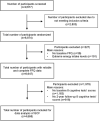Dairy Product Consumption and Changes in Cognitive Performance: Two-Year Analysis of the PREDIMED-Plus Cohort
- PMID: 35524484
- PMCID: PMC9541289
- DOI: 10.1002/mnfr.202101058
Dairy Product Consumption and Changes in Cognitive Performance: Two-Year Analysis of the PREDIMED-Plus Cohort
Abstract
Scope: Dairy consumption has been suggested to impact cognition; however, evidence is limited and inconsistent. This study aims to longitudinally assess the association between dairy consumption with cognitive changes in an older Spanish population at high cardiovascular disease risk.
Methods and results: Four thousand six hundred sixty eight participants aged 55-75 years, completed a validated food frequency questionnaire at baseline and a neuropsychological battery of tests at baseline and 2-year follow-up. Multivariable linear regression models are used, scaled by 100 (i.e., the units of β correspond to 1 SD/100), to assess associations between baseline tertile daily consumption and 2-year changes in cognitive performance. Participants in the highest tertile of total milk and whole-fat milk consumption have a greater decline in global cognitive function (β: -4.71, 95% CI: -8.74 to -0.69, p-trend = 0.020 and β: -6.64, 95% CI: -10.81 to -2.47, p-trend = 0.002, respectively) compared to those in the lowest tertile. No associations are observed between low fat milk, yogurt, cheese or fermented dairy consumption, and changes in cognitive performance.
Conclusion: Results suggest there are no clear prospective associations between consumption of most commonly consumed dairy products and cognition, although there may be an association with a greater rate of cognitive decline over a 2-year period in older adults at high cardiovascular disease risk for whole-fat milk.
Keywords: PREDIMED-Plus; cognition; cognitive decline; dairy; milk.
© 2022 The Authors. Molecular Nutrition & Food Research published by Wiley-VCH GmbH.
Conflict of interest statement
S.K.N. is a volunteer member of the not‐for profit group Plant–Based Canada. D.C. reported receiving grants from Instituto de Salud Carlos III. R.E. reported receiving grants from Instituto de Salud Carlos III, Uriach Laboratories and Grand–Fountain Laboratories for clinical trial, and personal fees from Brewers of Europe, Fundación Cerveza y Salud, Instituto Cervantes in Albuquerque, Milano and Tokyo, Fundación Bosch y Gimpera; nonfinancial support from Wine and Culinary International Forum, ERAB (Belgium), and Sociedad Española de Nutrición; and fees of educational conferences from Pernaud Richart (Mexico) and Fundación Dieta Mediterránea (Spain). R.C. reported receiving fees of educational conferences from Fundación para la investigación del Vino y la Nutrición (Spain). J.S.‐S. reported receiving research support from the Instituto de Salud Carlos III, Ministerio de Educación y Ciencia, the European Commission, the USA National Institutes of Health; receiving consulting fees or travel expenses from Eroski Foundation, Instituto Danone, Nestle, and Abbott Laboratories, receiving nonfinancial support from Hojiblanca, Patrimonio Comunal Olivarero, the California Walnut Commission, Almond Board of California, La Morella Nuts, Pistachio Growers and Borges S.A.; serving on the board of and receiving grant support through his institution from the International Nut and Dried Foundation and the Eroski Foundation; and personal fees from Instituto Danone; Serving in the Board of Danone Institute International. The rest of the authors have declared that no competing interests exist. The funders had no role in the design of the study; in the collection, analyses, or interpretation of data; in the writing of the manuscript, or in the decision to publish the results.
Figures
References
-
- Lee J., Fu Z., Chung M., Jang D. J., Lee H. J., Nutr. J. 2018, 10.1186/s12937-018-0387-1 - DOI
-
- World Health Organization , Dementia 2021, https://www.who.int/news‐room/fact‐sheets/detail/dementia (accessed: September 2021).


